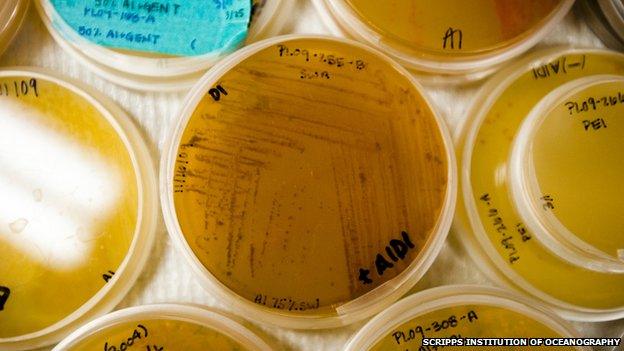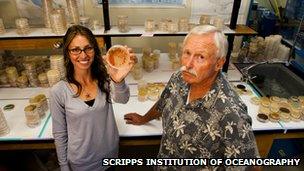New antibiotic that attacks MRSA found in ocean microbe
- Published

The discovery of genuinely new antibiotics is rare
A completely new and unusual antibiotic compound has been extracted from a marine microorganism found in sediments off the coast of California.
The discovery of genuinely novel antibiotics is rare, and experts say resistance to the drugs poses a grave threat to human health.
US scientists say the new compound, called anthracimycin, seems to be effective against MRSA and anthrax.
Details appear in the German journal Angewandte Chemie.
The unique chemical structure of the compound could lead to a new class of antibiotic medicines.
Thomas Frieden, director of the US Centers for Disease Control and Prevention, recently warned of the risk posed by antibiotic-resistant "nightmare" bacteria while Sally Davies, UK Chief Medical Officer, described them as a "ticking time bomb" that threatens national security.
The Infectious Disease Society of America has expressed concern that the rate of antibiotic development to counter resistance is insufficient. This makes this latest discovery particularly welcome news.

Lauren Paul and William Fenical were part of the team that made the discovery at Scripps
The structure of anthracimycin - described by Kyoung Hwa Jang and co-workers at the Scripps Institution of Oceanography, La Jolla, in their journal paper - is unlike any previously reported natural antibiotic.
The compound was extracted from Streptomyces bacteria that had been collected by Christopher Kauffman in Pacific Ocean sediments.
Research team leader William Fenical commented: "The real importance of this work is that anthracimycin has a new and unique chemical structure. The discovery of truly new chemical compounds is quite rare. This discovery adds to many previous discoveries that show that marine bacteria are genetically and chemically unique."
Initial testing of the antibiotic compound has demonstrated its efficacy in attacking anthrax, a bacterial disease that has been used as a bioterrorism weapon. But it also showed significant activity against Staphylococcus aureus, the MRSA superbug.
The discovery highlights the potential resource for new materials and compounds offered by the oceans, much of which remains unexplored.
- Published20 June 2013
- Published5 June 2013
- Published11 March 2013